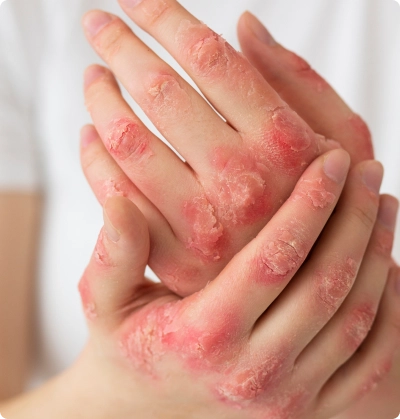Fungal Infections Treatment Service
Conquer Fungal Challenges Confidently with E-Health Network
Fungal infections, medically known as mycoses, arise when fungi invade and multiply in various parts of the body. These infections can range from mild, superficial conditions affecting the skin, nails, or mucous membranes, to severe systemic diseases that pose serious health risks, especially for individuals with weakened immune systems or chronic illnesses. Early detection and proper treatment are essential for effective management and preventing complications.

Common Fungal Infections We Address
Athlete’s Foot (Tinea Pedis)
A widespread fungal infection affecting the feet, especially the areas between the toes. Symptoms include intense itching, redness, scaling, cracking skin, and sometimes blistering. Athlete’s foot is highly contagious and commonly acquired in moist communal areas like locker rooms and swimming pools.
Jock Itch (Tinea Cruris)
This fungal infection affects the groin, inner thighs, and buttocks. It causes an itchy, red, ring-shaped rash that can be uncomfortable and persistent, especially in warm, moist environments or after physical activity.
Ringworm (Tinea Corporis)
Despite its name, ringworm is a fungal infection that causes round or oval red patches with clear centers and raised, scaly borders. It can affect any part of the body and is contagious through skin-to-skin contact or contaminated objects.
Yeast Infections (Candidiasis)
Overgrowth of Candida yeast leads to infections in moist areas such as the mouth (oral thrush), vagina (vaginal yeast infection), and skin folds. Symptoms include itching, soreness, white patches in the mouth, and discomfort.
Nail Fungus (Onychomycosis)
Fungal infections of the nails cause thickening, discoloration (yellow or brown), brittleness, and deformity. This condition can be persistent, often requiring prolonged treatment and professional care to prevent spread and nail damage.
Systemic Fungal Infections
In immunocompromised individuals or those with chronic conditions, fungi can enter the bloodstream or internal organs, leading to severe, sometimes life-threatening infections. These require immediate medical attention and specialized antifungal therapy.
Recognizing Symptoms of Fungal Infections
Common signs of fungal infections include:
- Persistent itching, redness, and irritation
- Dry, flaky, or peeling skin
- Thickened, discolored, or crumbly nails
- White patches or soreness inside the mouth or other mucous membranes
- Rashes or lesions in warm, moist areas such as groin, armpits, or under breasts
- In severe cases, fever, swelling, or pain around infected areas
Early recognition and diagnosis improve outcomes and reduce the risk of spreading infection.

Telehealth Services for Fungal Infections
- Convenient Same-Day Virtual Appointments: Get quick access to specialists without leaving home.
- Electronic Prescriptions: Medication sent directly to your preferred pharmacy for easy pickup or delivery.
- Ongoing Monitoring: Follow-up appointments to track healing and address concerns.
- Education and Support: Learn preventive measures and lifestyle modifications to reduce future risks.
Preventing Fungal Infections
Preventing fungal infections involves proactive hygiene and lifestyle habits:
- Keep skin clean and thoroughly dry, especially in folds and between toes.
- Wear breathable, moisture-wicking clothing and change socks and underwear daily.
- Avoid sharing towels, shoes, socks, or nail tools.
- Use protective footwear like sandals in communal showers, gyms, and pool areas.
- Maintain good nail care, avoiding artificial nails or nail trauma that can invite infection.
- Manage chronic conditions like diabetes effectively to reduce susceptibility.
When to Seek Immediate Medical Care
Seek urgent medical attention if you experience:
- Rapidly spreading redness, swelling, or pain around an infection
- Fever or systemic symptoms alongside skin infection
- Severe discomfort, blistering, or open sores
- Persistent infections despite treatment
- Signs of systemic involvement such as fatigue, confusion, or shortness of breath (especially in immunocompromised patients)
Early intervention can prevent serious complications.
Schedule a Telehealth Appointment
If you suspect a fungal infection or have symptoms needing evaluation, E-Health Network’s telehealth services offer expert diagnosis and treatment conveniently and confidentially from your home. Don’t delay care; schedule an appointment today and take control of your health.
